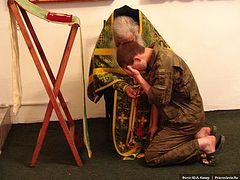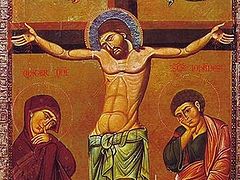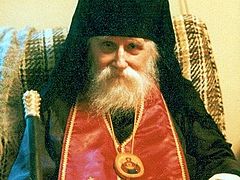The Reading from the Holy Gospel according to St. Matthew 18:23-35
Each and every time we hear the words of the Lord Jesus Christ we are blessed beyond belief. There have been many teachers and philosophers and even prophets but with the Lord we hear words full of power and beauty. Words that offer us life and resurrection.
Each time we enter the Church we should be excited and say within ourselves “What will God teach me today?” Today the Son of God teaches us all about forgiveness. Our Lord Jesus Christ tells us that there is an intimate connection between the kingdom of heaven and our ability to forgive. He reminds us again and again that without forgiveness there can be no salvation. And this should make sense to us because the one who cannot forgive others, can not be open to forgiveness when it is offered to him, just as the one who does not love others cannot possibly accept the love that is directed towards him.
Forgiveness opens the door to the kingdom of heaven. Our act of forgiving others is powerful. It is a sign that we completely, totally understand how much harm we have done in our own lives, and how much God has forgiven each of us.
How many marriages could be restored if only there was forgiveness? How many broken friendships and difficult family situations could be healed if only there was forgiveness? How many churches could thrive and grow and be active in their worship and in their service to the world, if only there was forgiveness between all of their members?
The Lord tells us that when we don’t forgive someone who has asked for our forgiveness … we are effectively holding their sins against them as a form of debt. Christ is clearly troubled by this behavior. All of humanity owes a debt to God based on their sins. But God did not demand an offering or a payment from us. He Himself has provided the offering. Perhaps there is a lesson there for us and the ways that we interact with others who may have hurt us or done us some wrong.
We see some problems in our country—problems between different groups of people. Many of these problems are exaggerated by the media (but that is for another conversation). People desire justice, they demand apologies, they cry out for their rights but where does forgiveness fit in? How many problems could be solved through the simple act of releasing our anger or animosity for others? Instead we see the opposite happening. People are increasing their anger and using it as an excuse to show hatred toward others.
People are no longer talking about what happens to them personally or individually, they begin to talk about what has happened to them “collectively.” If we begin to speak about all wrongdoing as collective, then there is no possible way to be free of the mountain of debt that one group owes to another. This is the equivalent of daily compounded interest in the financial world. There is no possible way to move forward and heal. You can call it a demand for “justice” or “rights," but you cannot call it the Gospel of Jesus Christ.
The Gospel of Jesus Christ is not built on justice or rights, it is built on mercy. It is built on forgiveness. Our life has to be built on the undeniable fact that I owe much more to God than I can ever repay. I have sinned against Him in infinite ways. If My Lord is keeping a record of my sins, then I am in trouble. If He is keeping record of our “collective” sins, then we are in deep, deep trouble. God is love and out of His divine compassion He holds no account of our wrongdoings. He offers a clean slate. He invites us back to His table. He allows us to sit and dine with Him. God treats us with great respect and mercy. This is what God is asking of us. He is asking us to understand and grasp the ways that He has forgiven us ... and apply that understanding to our relationships with others. If God’s warmth and reconciliation has penetrated our hearts, it is impossible that we would not offer that same warmth and reconciliation to others.
What God demands of us seems like too much. But what God asks of us, He has already done for us. The Lord Jesus Christ demonstrated the ability to forgive even in the midst of His ordeals and great suffering upon the cross! He cries out Father forgive them, for they know not what they do! By demonstrating such an ability, the crucified Lord affirms that it is indeed possible for us to do the same. And by opening up this possibility of forgiveness, God will open to us the doors of His heavenly kingdom and He will allow us to dwell with those who have suffered injustices and triumphed through forgiveness.
This is the life that is offered to us. A life that starts with God’s act of forgiveness and is fulfilled by our forgiveness of anything and everything that anyone may do to us. May the words of the all-forgiving Lord be always on our lips Father forgive them! Glory be to God forever AMEN.





Pardon? But He is keeping a record of our sins. And so are the devils. We will answer for our unconfessed misdeeds, our works of kinship with the devil when we die as we attempt to ascend through the Toll Houses. And again we will answer at the Final Judgement. We need to confess and truly repent of our sins, daily and hourly including forgiving others if we want our slate to be wiped clean before we die, thereby having some hope of salvation. That's the work of each Christian.